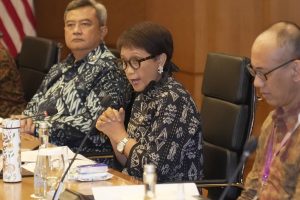Southeast Asian foreign ministers renewed their alarm over — and condemnation of — air strikes, artillery shelling, and other acts of deadly violence in Myanmar, but struggled Friday to overcome differences on how to address the prolonged civil strife.
The Myanmar crisis was high on the agenda when top diplomats of the Association of Southeast Asian Nations met Tuesday and Wednesday in the Indonesian capital of Jakarta. The 10-nation bloc includes Myanmar, but its foreign minister was again barred from attending this week’s meetings due to the military government’s failure to comply with a five-point emergency plan drafted to ease the violence.
ASEAN has been trying to enforce the plan it forged with Myanmar’s top general in 2021, which calls for an immediate end to the violence, the start of talks brokered by a special envoy among contending parties, and the delivery of aid to displaced villagers.
But Myanmar’s military government has done little to enforce the plan, prompting ASEAN to ban its representatives from top-level meetings.
Nearly 3,000 people have been killed by the military government since it took power and more than 23,700 have been arrested, according to the Assistance Association for Political Prisoners, a non-governmental organization that tracks killings and arrests.
On Wednesday, Thailand’s Foreign Minister Don Pramudwinai told ASEAN counterparts that he met with ousted Myanmar leader Aung San Suu Kyi in detention over the weekend and that she encouraged dialogue to resolve the crisis gripping her nation.
Don is the only government official outside of Myanmar known to have met with Suu Kyi since she was detained along with other officials when the army seized power from her elected government on Feb. 1, 2021. He said Myanmar’s military government authorized his rare meeting with the democracy icon.
ASEAN, however, did not authorize it. The regional bloc has been careful in taking steps that could be perceived as a recognition of the military government, which has been sanctioned by Western and European governments.
Indonesia, Singapore and Malaysia are known to have taken a strong stand against any engagement that could be perceived as recognizing Myanmar’s top generals as legitimate leaders. Indonesian Foreign Minister Retno Marsudi, the host of this week’s summit, has refused to comment on Don’s meeting with Aung San Suu Kyi. Instead, she underscored that the regional group was still pursuing ASEAN’s emergency plan focused on encouraging peace dialogues to try to resolve the Myanmar crisis.
However, a joint communique issued by the ministers Friday said that “a number of ASEAN member states viewed as a positive development” the initiative by Thailand, without elaborating or specifying which states were in support.
An escalation of the crisis could drive large numbers of refugees from Myanmar to neighboring Thailand. In a news briefing Thursday, Don said his country has to take urgent steps to help resolve the crisis.
“This is our own initiative. Why? Because we have a long border with Myanmar (2,400 kilometers or 1,500 miles) and things happen every day,” Don said. “Like Indonesia, you are far away from Myanmar. You don’t know what is happening.”
“We are affected, India is affected, countries bordering Myanmar are all affected,” he said.
Marsudi underscored the more than 110 engagements Indonesia, as ASEAN’s leader this year, has initiated with rival groups in Myanmar to build trust and confidence that she said could lead to easing tensions and violent confrontations.
“We strongly condemned the continued acts of violence, including air strikes, artillery shelling, and destruction of public facilities,” the ASEAN foreign ministers said in their communique. They called on allied nations and groups, including the United Nations and neighboring countries of Myanmar, to work with ASEAN to enforce the emergency peace plan.

































